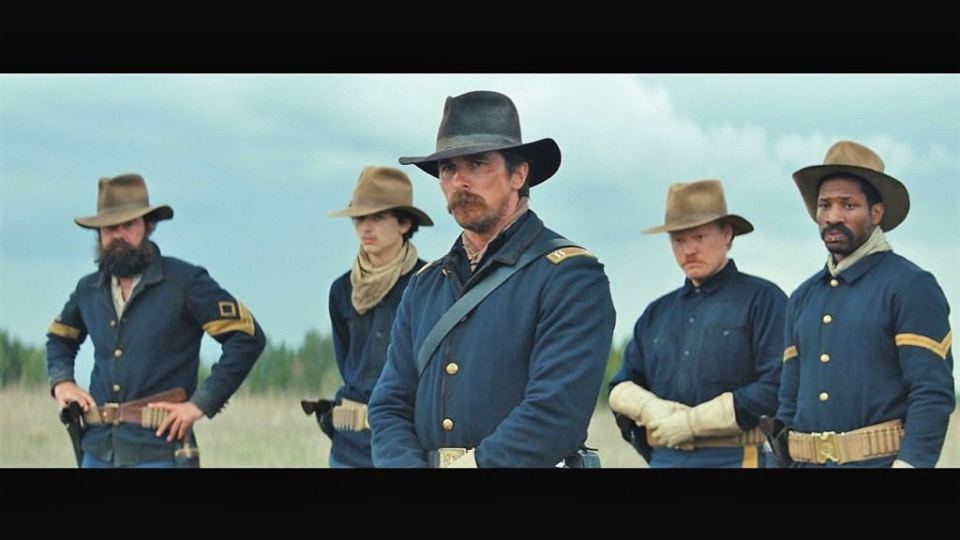If you’re a fan of westerns, then you’ll love the story in Hostiles, a gritty and authentic film set in 19th century New Mexico. The story centers on the character of Cheyenne chief Yellow Hawk, played by Wes Studi and his interactions with military escort Joseph Blocker, played by Christian Bale. “It is a poignant tale of loss and sacrifice, told primarily through gestures and actions, not words and monologue.” According to the Scott Cooper Miami Florida Fan Club, “Hostiles will undoubtedly go down as a film about music and characters.”
The Story
The story begins when Comanche raiders surround the homestead of Rosalee Quaid (played by Rosamund Pike) and burn her house, murdering her children and husband in the process. At the same time, military man Joseph Blocker is out committing atrocities of his own, capturing and tormenting Apache families, rounding them up and dragging them off to Fort Berringer. The era of territorial battles between native Americans and European settlers, however, is coming to an end, and the aging Blocker soon realizes that the lifestyle he once enjoyed is all but over.
An order comes down from Blocker’s superiors that he is to escort his dying enemy Cheyenne chief Yellow Hawk back to the Valley of Bears far to the north in Montana. During the journey, they bump into Rosalee Quaid, who is initially scared of the sight of the Indian chieftain, thanks to her experience with the Apache weeks earlier.
The moral message of the film is somewhat ambiguous. On the one hand, it is a homage to the bloodier side of the frontier spirit – a world in which there was freedom from the state, but also terrible butchery, where you never knew whether you’d be next to get shot. On the other, there’s Blocker and his comrade’s longing for the “good old days” when they tore around the country, fighting pitched battles with the native Americans and blasting their brains out.
The Script
The film is an adaptation of an original manuscript from Donald E. Stewart, a man best known for his work on Costa-Gavras’s Missing. The director of the film, Scott Cooper, claims that it is a tale of the maltreatment of the native Americans and a reflection of contemporary race relation issues, but that certainly isn’t how it comes across when you watch it for its entire length. There is more nuance and grit than that. It’s not an identity piece through and through. It is more a tale of the horrors of killing and the impact that it has on families, personalities, and the people who commit acts of atrocity, not a political allegory.
Hostiles isn’t afraid to explore the moral quandaries faced by characters as they try to navigate what often seems like a hellish world. Yellow Hawk’s role is less a tale of captivity and illness and more one of guilt and grief. The Cheyenne chief is remarkably quiet throughout the film, but he nevertheless pricks Blocker’s conscience and brings his psychological struggle to a head.
The Music
Perhaps the most impressive part of the film isn’t the acting or the cinematography, but the score. Director Max Richter chose a soundtrack that speaks powerfully to the mourning’s and the troubles of the world in which the characters find themselves. Sonorously long notes reflect the grandeur of the moral battles being fought here, both inside and out.
Richter cleverly makes heavy use of a Turkish musician Gorkem Sen’s who plays the yaybahar, an instrument famous for being able to create abstract sounds that meld perfectly with what’s happening on screen.
To say that the cinematography is second-rate, though, would be a step too far. The visual beauty of the film is remarkable. Masanobu Takayanagi, who was responsible for this aspect of the film, does a great job of capturing the harsh realities of the western landscape with all its jagged rocks, poking up into the sky. At one point in the film, the rain begins to pour, and you suddenly have the sensation of water building up in the soles of your shoes.
The Bottom Line
The screenplay takes a deep dive into the ethical dilemmas faced by people trying to eke out an existing in the wild west at a time in history when the rest of the world was beginning to ask uncomfortable questions. The actors seem to understand this intuitively, which is one of the reasons the film is so compelling. You can feel the pressure they’re under as if it is your own. Not many films do that.


